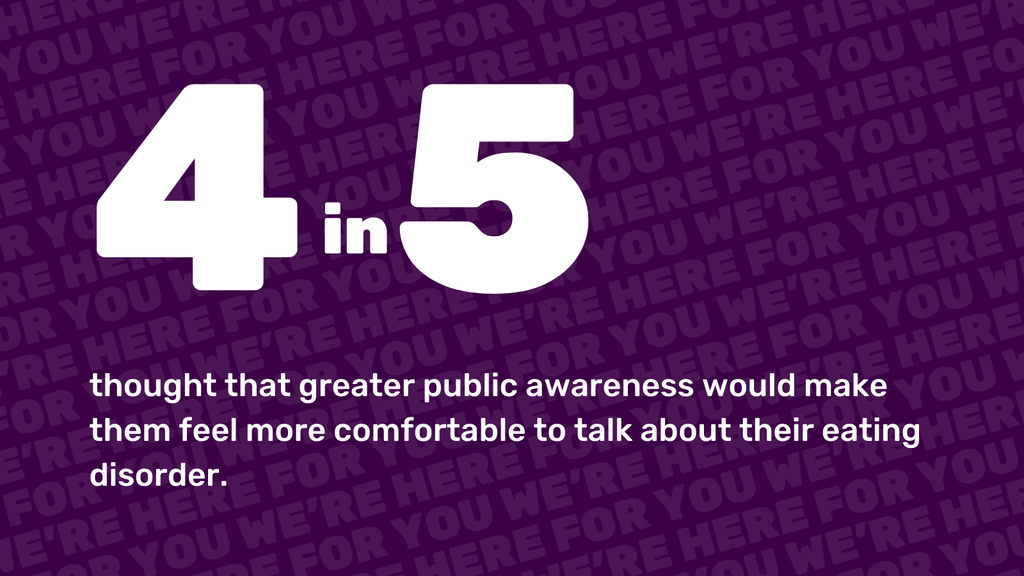Eating disorders can affect anyone
What is Eating Disorders Awareness Week?
Every year, during Eating Disorders Awareness Week we raise awareness of these complex mental health conditions highlighting a specific topic.
This year, we're talking about how eating disorders can affect anyone.
WHEN: 24 February – 2 March 2025
THEME: Eating disorders can affect anyone.
OBJECTIVE: To raise awareness of eating disorders and that they can affect anyone at any time of their lives.
TARGET AUDIENCE: General public

Our survey respondents told us that they would’ve felt more comfortable opening up to others about their experiences if there was greater awareness and understanding of eating disorders.
This would also help challenge misconceptions about eating disorders that can stop people reaching out for help.
The messaging
You probably know someone living with an eating disorder – but you may not realise it.
Right now, at least 1.25 million people in the UK are living with an eating disorder. That’s more than 1 in 50 people – but the real number could be even higher. Eating disorders like ARFID, anorexia, bulimia, binge eating disorder and OSFED are complex mental health conditions which are often misunderstood, mislabelled or undiagnosed.
Eating disorders don’t just affect the person with the condition, friends and family often become carers – feeling helpless and heartbroken, as they watch their loved one struggle. Eating disorders are one of the biggest mental health challenges of our time and they can affect anyone at any time.
Therefore, we are raising awareness that:
Eating disorders can affect anyone and that it’s not always who you expect.
“I do not fit the typical stereotype. I was first diagnosed in my 30s, I have had a career, and I am Asian. People couldn't believe I could develop an eating disorder because of my background.”
We felt it was important to spread the message that anyone can be affected regardless of their age, gender, sexuality, ethnicity or background.
People also fear stigma around saying they have an eating disorder due to misconceptions about who is affected and the lack of knowledge about how eating disorders present. Busting these misconceptions can help people seek help earlier, increasing their chances of a full recovery.
How we incorporated different voices
We worked together with Lived Experience volunteers to shape our messaging and key content – working with a small group to review the concept and development of our campaign video.
We surveyed our supporters and the wider public to find out more about their experience of being affected by an eating disorder. This provided us with insight into the experiences of those affected by eating disorders and helped shape our campaign messaging. We also sought feedback from our lived experience volunteers through all aspects of developing our campaign.
We ran a survey in December and January to gather lived experiences of eating disorders.
Our key findings
1900 people responded in total and we found that of our respondents:
- 4 in 5 (1128/1370) have experienced misconceptions from others about their eating disorder.
- 4 in 5 (1082/1360) thought that greater public awareness would make them feel more comfortable to talk about their eating disorder.
- 2 in 3 (749/1131) would not feel comfortable talking to a teacher about their eating disorder.
- 2 in 3 (670/1031) would not feel comfortable talking to their line manager about their eating disorder.
- 2 in 3 (837/1328) would not feel comfortable talking to a colleague about their eating disorder.
We will be highlighting these responses over the week and sharing content to help raise more awareness of eating disorders so people may find it easier to open up and talk about them.
Eating disorders are so much more than just food. A lot of the time they are coping mechanisms for broader and complex issues a person is facing.
Related Pages
24 February 2025
We asked people affected by eating disorders – either by experiencing it themselves, or through looking after a loved one – what
Read more24 February 2025
We asked people whether they felt comfortable opening up about their eating disorder at work. This is what they said.
Read more24 February 2025
How we developed the campaign video and messaging for eating disorders awareness week 2025
Read moreEating disorders at work
On Tuesday 25 February we are focusing on eating disorders in the workplace.
With at least 1 in 50 people in the UK living with an eating disorder, you are probably working with someone who is struggling with an eating disorder or may be supporting someone who is. Having the right support in place at work can make a big difference to someone’s recovery or to help them manage their caring responsibilities.
It’s not always obvious when someone has an eating disorder. As eating disorders are secretive illnesses, many people become isolated from their loved ones, but most people still have to go to work and have regular contact with their colleagues. This means that colleagues can be some of the best placed people to notice when someone may be struggling.
Anyone can be affected by an eating disorder wherever they work and whatever their level in an organisation. On Tuesday 25 Feb, during Eating Disorders Awareness Week, we’ll be highlighting the importance of a supportive workplace for those affected by eating disorders.
How we can help
We have a range of resources on our website for those with an eating disorder, those looking after someone with an eating disorder and for those who want to work with us to help support those affected.
Get Involved
Find out how you can help spread the word this Eating Disorders Awareness Week